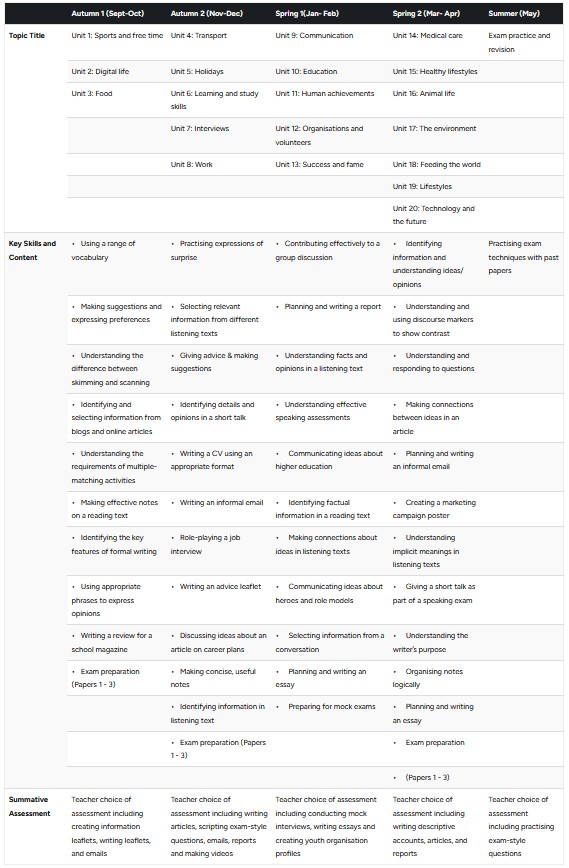| Topic Title | | Unit 1: Sports and free time | Unit 4: Transport | Unit 9: Communication | Unit 14: Medical care | Exam practice and revision |
| Unit 2: Digital life | Unit 5: Holidays | Unit 10: Education | Unit 15: Healthy lifestyles | |
| Unit 3: Food | Unit 6: Learning and study skills | Unit 11: Human achievements | Unit 16: Animal life | |
| Unit 7: Interviews | Unit 12: Organisations and volunteers | Unit 17: The environment | |
| Unit 8: Work | Unit 13: Success and fame | Unit 18: Feeding the world | |
| | | Unit 19: Lifestyles | |
| | | Unit 20: Technology and the future | |
| Key Skills and Content | | • Using a range of vocabulary | • Practising expressions of surprise | • Contributing effectively to a group discussion | • Identifying information and understanding ideas/opinions | Practising exam techniques with past papers |
| • Making suggestions and expressing preferences | • Selecting relevant information from different listening texts | • Planning and writing a report | • Understanding and using discourse markers to show contrast | |
| • Understanding the difference between skimming and scanning | • Giving advice & making suggestions | • Understanding facts and opinions in a listening text | • Understanding and responding to questions | |
| • Identifying and selecting information from blogs and online articles | • Identifying details and opinions in a short talk | • Understanding effective speaking assessments | • Making connections between ideas in an article | |
| • Understanding the requirements of multiple-matching activities | • Writing a CV using an appropriate format | • Communicating ideas about higher education | • Planning and writing an informal email | |
| • Making effective notes on a reading text | • Writing an informal email | • Identifying factual information in a reading text | • Creating a marketing campaign poster | |
| • Identifying the key features of formal writing | • Role-playing a job interview | • Making connections about ideas in listening texts | • Understanding implicit meanings in listening texts | |
| • Using appropriate phrases to express opinions | • Writing an advice leaflet | • Communicating ideas about heroes and role models | • Giving a short talk as part of a speaking exam | |
| • Writing a review for a school magazine | • Discussing ideas about an article on career plans | • Selecting information from a conversation | • Understanding the writer’s purpose | |
| • Exam preparation (Papers 1 - 3) | • Making concise, useful notes | • Planning and writing an essay | • Organising notes logically | |
| • Identifying information in listening text | • Preparing for mock exams | • Planning and writing an essay | |
| • Exam preparation (Papers 1 - 3) | | • Exam preparation | |
| | | • (Papers 1 - 3) | |
| Summative Assessment | | Teacher choice of assessment including creating information leaflets, writing leaflets, and emails | Teacher choice of assessment including writing articles, scripting exam-style questions, emails, reports and making videos | Teacher choice of assessment including conducting mock interviews, writing essays and creating youth organisation profiles | Teacher choice of assessment including writing descriptive accounts, articles, and reports | Teacher choice of assessment including practising exam-style questions |

